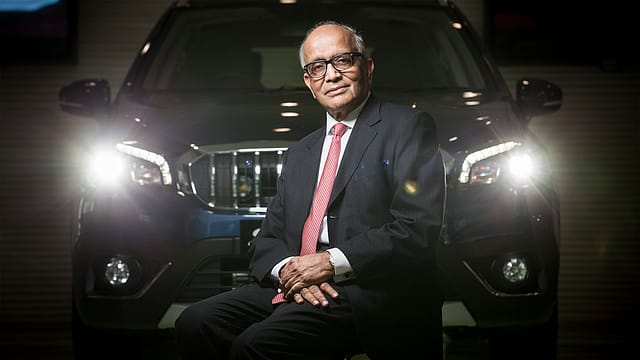Heavy taxation coming in the way of growth in car market: RC Bhargava
ADVERTISEMENT

The passenger vehicle industry in India, in terms of growth, cannot reach its potential, if the government continues to levy heavy taxes on passenger vehicles, says RC Bhargava, chairman, Maruti Suzuki India Limited (MSIL). "Throughout our history, all motor vehicles—whether it is hatchbacks, SUVs, MUVs, sedans—have always been in the highest tax bracket. This clarification only confirms that passenger vehicles will be taxed in the 50% bracket. How can the industry grow when it is taxed so heavily," he asks. His sentiments are echoed by Hisashi Takeuchi, MD and CEO, MSIL. "Of course, a relatively lower tax makes it easier for more people to buy a car, but the tax is something that the government should carefully decide," he says.
Bhargava refers to the recent announcements by the GST council—which has clarified a single definition of SUVs across the country. Finance Minister Nirmala Sitharaman has said that any vehicle which has an engine capacity exceeding 1500cc; a length of 4,000 mm and above, and ground clearance of more than 170mm, will be classified as an SUV, and a higher cess of 22% will be applicable. Currently, vehicles satisfying these criteria are levied with a GST rate of 28% and a cess of 22%, but the definition of SUVs was not consistent across all states in India, causing widespread confusion. "If cars do not meet any of these criteria, a lower cess rate will be applicable," says Vivek Johri, chairman of Central Board of Indirect Taxes and Customs. The council also said that it will look into the possible inclusion of sedans and MUVs in the SUV category.
According to Bhargava, some of the decisions are taken by the government due to incorrect information by the bureaucracy. "This happens because of incorrect advice and a lack of understanding of specific sectors," says the octogenarian and former bureaucrat, who has been with MSIL since its days as a fledgling PSU tasked with creating a more affordable car for India.
He also believes that the current taxation regime possibly stems from the socialist way of thinking. "Is it that we are, in some way, accepting that cars, or whatever we think are luxury products, should be charged more than non-luxury products? That is an old, socialist way of looking at things," he says, adding further that the taxation should also be decided depending on the total benefits to the economy. "You need to look at it in terms of revenues; in terms of generation of employment, which flows from automation, because all countries which have grown their manufacturing capacity, and have created wealth and grown GDP fast and effectively have done it on the back of the automobile industry."
He also suggests that policymakers should look at taxation in much richer countries—where the affordability of cars for the average person is a lot more than what it is in India. "You take the whole of the EU, the maximum VAT levied on cars in Europe is about 18-19%. In Japan, it is about 10%. This is not very different from the average VAT charge on products. In Japan it's almost identical to the average VAT charge," he says. The two levels of taxation were originally implemented with the intention of promoting small cars. "At the time, the intention was to promote small cars because they consumed less fuel, and therefore, generated lesser emissions," he says.
While there is a single tax slab for electric vehicles, irrespective of size, Bhargava rejects the idea of having one uniform tax rate for all passenger vehicles across India. "The current situation is because of the regulatory changes that have happened, the burden of regulatory changes is a lot more on small cars than it is on the big cars, and it is changing the whole market behaviour. People are no longer buying small cars in the same number as they used to. So, one has to keep in mind the effect of these regulatory changes and its impact on the small car market, and that is one argument for not having a uniform tax on all small and big cars," he explains.